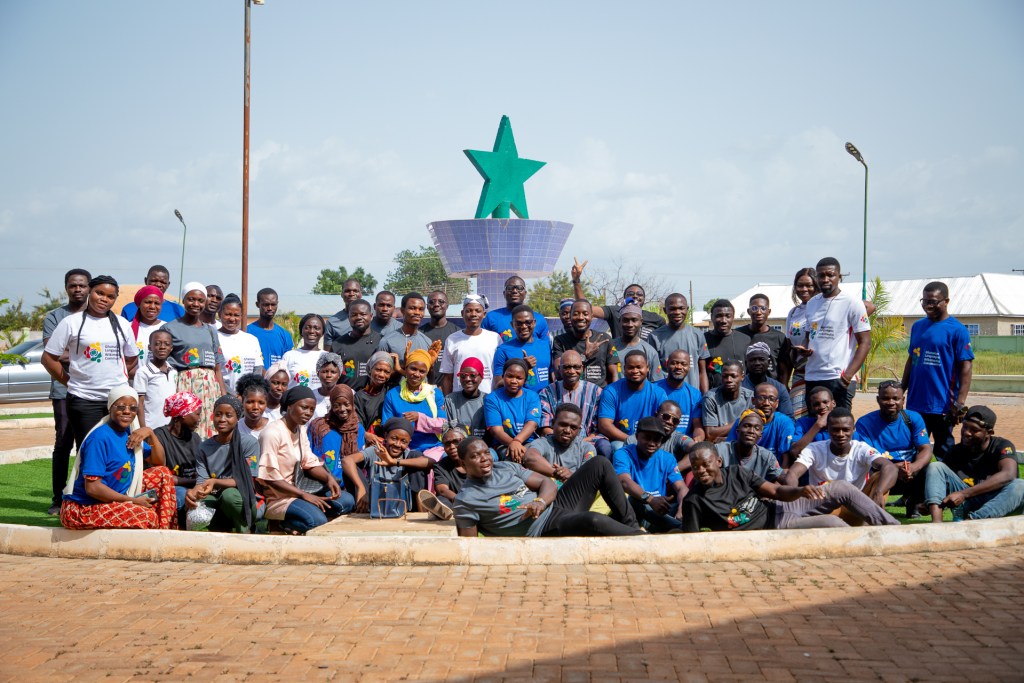
The Ghanaian Wikimedia Languages Meetup, sponsored by the Wikimedia Foundation in partnership with Gurene Wikimedia Community, Moore Wikimedia Community, Ghanaian Pidgin Wikimedians Community, Dagbani Wikimedians User Group, Ewe Wikimedians User Group, Fante Wikimedians Community, Dagaare Wikimedians Community, Kusaal Wikimedia Community, Wikimedians of Twi Language, Rising Voices, Wikimedia Language Diversity Hub, and Art+Feminism, was held at the Ghana Registered Nurses and Midwives Guest House in Tamale, the Northern Regional Capital, from May 12-14 May 2023.
This event brought together participants from diverse linguistic backgrounds, each with a shared passion for enriching the world’s knowledge through Wikipedia. Over the course of the meetup, attendees engaged in various activities, including networking, workshops, and open mic discussions aimed at strengthening the Wikimedia ecosystem in Ghana, identifying the major challenges, and suggesting ways to address those issues.
Around 60 Wikimedians from nine Ghanaian language Wikimedian communities, including Kusaal, Ewe, Dagaare, Twi, Dagbani, Ghanaian Pidgin, Gurene, Fante, and Moore Wikimedia communities, helped to bridge the digital divide that keeps people from accessing the internet due to language barriers. A two-day conference gave participants from the various communities in the country the opportunity to brainstorm on how to better distinguish language platforms and learn from others what has worked and what has not worked.
Day One: A Journey of Introductions and Exploration
The meetup kicked off with an atmosphere of enthusiasm as participants from different Wikipedia communities introduced themselves. It was inspiring to witness the diverse array of linguistic backgrounds and the collective dedication to advancing knowledge in Ghana.
Maxwell Beganim, Co-Founder of the Ghana Pidgin Language Community and core team member of the GWLC, welcomed the participants from all the language groups who attended the maiden edition of the GWLC. He highlighted the importance of unity in diversity, which fundamentally gives essence to the local language.
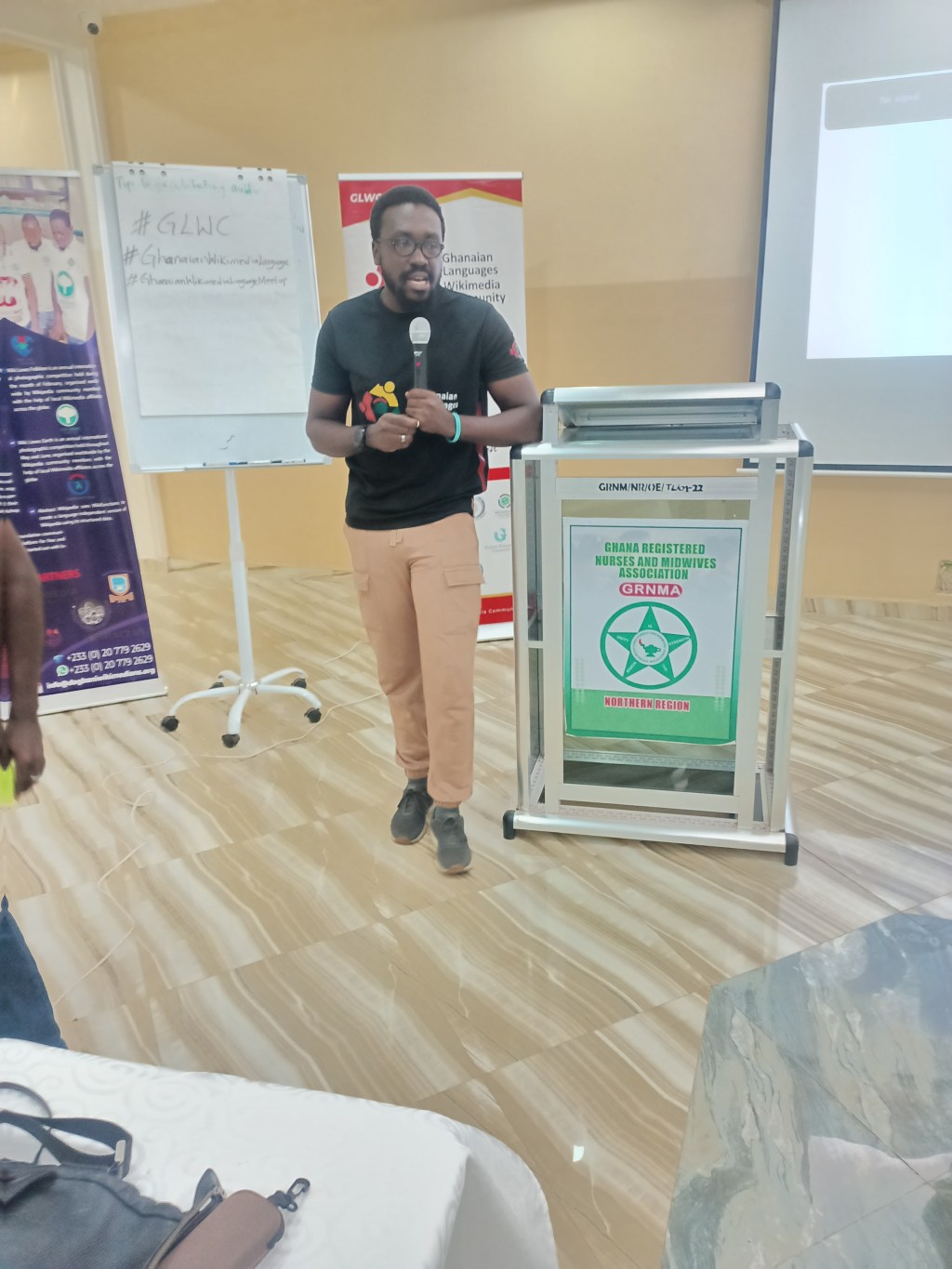
Opening Remarks by Mr. Shahadu Sadik
To set the stage for the event, Shahadu Sadik, the Executive Director of the Dagbani Wikimedians User Group, delivered an insightful opening address. With his deep understanding of the Wikimedia movement and its potential, Mr. Shahadu emphasized the importance of collaboration and community-building.
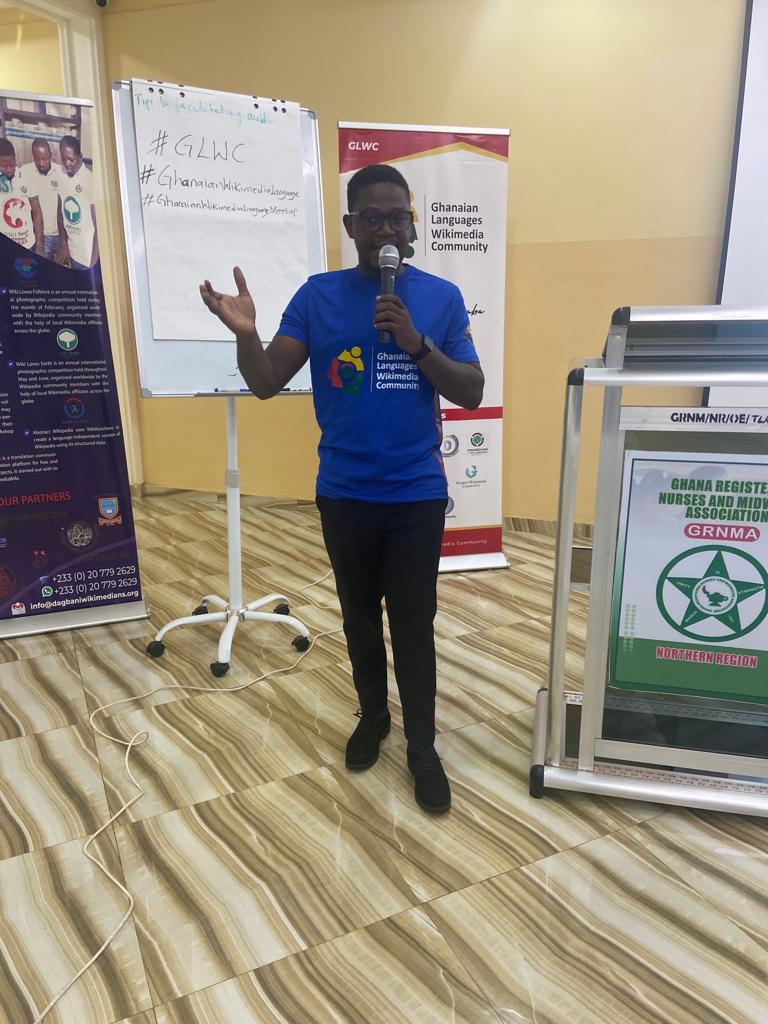
Unveiling the Curationist: Making Art and Artifacts Accessible
A noteworthy highlight of Mr. Sadik’s speech was his introduction of the Curationist, a powerful and free tool designed to enhance access to millions of digital images of artworks and artifacts from around the world. Curationist is a free online resource that brings together arts and culture communities to find, share, collaborate, and reimagine cultural narratives.
As Mr. Sadik explained, the Curationist enables users to explore a vast collection of artworks and artifacts from various cultures and eras, all on one accessible platform. This revolutionary tool empowers Ghanaian Wikimedians to curate engaging content, bring cultural heritage to life, and showcase the rich tapestry of Ghana’s artistic and historical legacy to a global audience.
Community Projects: Showcasing Wikimedia’s Impact in Ghana
The meetup provided a platform for each Wikimedia community to showcase their ongoing projects and initiatives. Representatives highlighted the diverse range of topics they were working on, from creating and expanding Wikipedia articles in local languages to digitizing and preserving cultural heritage.
The Dagbani Wikimedians User Group in perspective
During the Ghanaian Wikimedia Languages Meetup, Mr. Yussif Abdul Rasheed, the Projects Manager for the Dagbani Wikimedians User Group, represented their group and shared an overview of their notable projects and collaborations. Here are the highlights of their initiatives:
- Activating Local Language Communities:
In September 2020, the Dagbani Wikimedians User Group embarked on a project to activate local language communities. Their aim was to encourage the use of the Dagbani language in contributing to Wikimedia projects, particularly Wikipedia.
- Dagbani Bachinima:
In December 2020, the group successfully organized the Dagbani Bachinima project. This initiative aimed to produce short sentences in the Dagbani language, effectively promoting local language content and cultural preservation.
- WikiLoves Campaigns:
The Dagbani Wikimedians actively participated in various WikiLoves campaigns, including Wiki Loves Folklore, Wiki Loves Monuments, and Wiki Loves Earth. These campaigns focused on capturing and sharing images related to folklore, historical monuments, and natural landscapes in Ghana. The photographs taken during these campaigns were uploaded to Wikimedia Commons, enriching the visual resources available on Wikimedia projects.
- Translating Mediawiki Statements:
The group embarked on a project to translate the most commonly used statements in MediaWiki on TranslateWiki.
- Collaboration with Moleskine Foundation:
The Dagbani Wikimedians partnered with the Moleskine Foundation to translate articles related to the coronavirus pandemic.
- Dagbani Wikipedia Saha:
The group talked about the Dagbani Wikipedia Saha, a tele-education program focused on training individuals interested in contributing to Wikipedia. This initiative aimed to empower community members with the skills and knowledge required to create and improve content on the Dagbani Wikipedia.
- Participation in Internet Governance Forum and Celtic Knot Conference:
The Dagbani Wikimedians actively participated in notable events such as the Internet Governance Forum and the Celtic Knot Conference. These engagements provided opportunities to share their experiences, insights, and contributions to the Wikimedia movement with a wider audience.
During his presentation, Mr. Yussif Abdul Rasheed from the Dagbani Wikimedians User Group also highlighted some of the challenges they face in their Wikimedia endeavors. These challenges include:
- Internet Connectivity Challenges:
Access to reliable and affordable internet connectivity remains a significant obstacle in their office space. Limited or unstable internet connectivity can hinder participation and collaboration in online Wikimedia projects, making it difficult for contributors to engage consistently.
- Retaining Active Editors:
Sustaining active contributors and editors over the long term is a common challenge for many Wikimedia communities. Encouraging individuals to continue their involvement requires ongoing support, motivation, and opportunities for skill development. Efforts to build a strong sense of community, provide mentorship, and recognize the contributions of dedicated editors can help address this challenge.
- IT Technical Know-How:
Technical proficiency in using Wikimedia tools and platforms is essential for effective contributions. However, not all community members may possess the necessary IT skills or knowledge. Providing training programs, workshops, and resources to enhance technical capabilities can empower community members to navigate the digital landscape confidently.
- Internet Data Accessibility:
The cost and availability of internet data can be barriers to engagement, particularly for individuals who rely on limited or expensive data plans. Accessing and contributing to Wikimedia projects may be challenging if community members face restrictions on their internet data usage. Advocacy for affordable and accessible internet data options can help mitigate this challenge.
In his concluding remarks, Mr. Yussif Abdul Rasheed shared some powerful quotations that emphasize the significance of language and its impact on culture and connection. These quotations are as follows:
- “Language is the road map of a culture. It tells you where its people come from and where they are going.” – Rita Mae Brown
This quote by Rita Mae Brown highlights the fundamental role of language in understanding and appreciating a culture. Language serves as a guide, providing insights into the origins, traditions, and aspirations of a community. It acts as a powerful tool for preserving and sharing the unique aspects of a culture, acting as a bridge between the past and the future.
- “If you talk to a man in a language he understands, that goes to his head. If you talk to him in his own language, that goes to his heart.” – Nelson Mandela
Nelson Mandela’s quote emphasizes the profound impact of speaking to someone in their native language. When we communicate with others in their mother tongue, we establish a deeper connection that transcends mere comprehension. By engaging with individuals in their own language, we foster a sense of understanding, empathy, and cultural appreciation. It signifies our respect for their heritage and creates a bond that touches the core of their being.
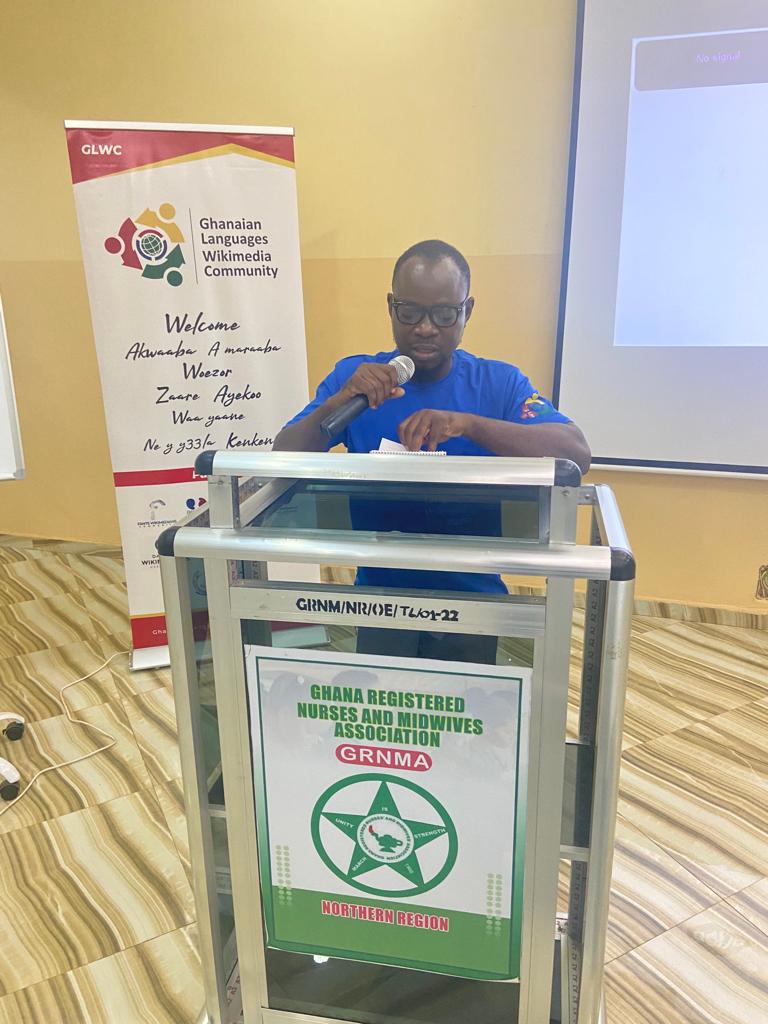
Ewe Wikimedians User Group in perspective
Mr. Christopher represented the Ewe Wikimedians User Group and shared their group’s activities, challenges, and aspirations for the year. Here is a summary of their presentation:
Activities
The Ewe Wikimedians User Group began their initiatives by organizing Wiki Loves Africa, a photography contest focused on capturing images that represent African culture, traditions, and heritage. Through photowalks, participants explored various locations, documenting the rich cultural tapestry of the Ewe people and their surroundings.
Additionally, the group actively engaged in a Wikidata contest, contributing to the expansion of structured data on Wikidata. By participating in this contest, the Ewe Wikimedians aimed to enhance the availability of accurate and relevant information about Ewe culture and history.
Challenges
Mr. Christopher highlighted two main challenges faced by the Ewe Wikimedians User Group. The first challenge is time constraints, as members often have other commitments that limit their availability for Wikimedia activities. The second challenge is the need for support, both in terms of resources and expertise, to further their initiatives effectively.
Goals for the Year
In the coming year, the Ewe Wikimedians User Group aims to strengthen its structure and team. By building a cohesive and collaborative team, they seek to enhance their capacity to contribute to Wikimedia projects and drive sustainable growth within their community.
Additionally, the group aspires to improve the quantity and quality of Ewe-language content across Wikimedia platforms. They aim to expand existing articles, create new ones, and ensure the accuracy and reliability of the information available in the Ewe language.
Fante Wikimedians Community in perspective
Mr. Robert Jamal, representing the Fante Wikimedians Community, shared their journey and challenges faced by the Fante Wikipedia. Here are the key points from his presentation:
Background and Progress
Mr. Jamal highlighted that the Fante Wikipedia was initiated a few years ago, but initially faced difficulties in gaining traction. However, he mentioned that significant progress was made recently when Fante Wikipedia entered the incubator phase. He expressed gratitude to Mr. Sadik and Mr. Dnshitobu from the Dagbani Wikimedians User Group for their guidance and support, which helped the Fante Wikipedia successfully graduate from the incubator within a year.
Challenges
The Fante Wikimedians Community faces several challenges in their Wikimedia efforts. One major challenge is related to internet data problems. Limited access to affordable and reliable internet data hampers the participation and engagement of community members in contributing to the Fante Wikipedia. Another challenge is the lack of active editors, which impacts the growth and development of the Fante Wikipedia.
Future Plans and Collaborations
Mr. Jamal outlined their plans for the future, which include collaborating with various communities. By partnering with other Wikimedia communities, the Fante Wikimedians aim to expand their reach, increase participation, and foster knowledge exchange. Collaborations can help address challenges, share experiences, and collectively work towards enhancing Fante Wikipedia and other Wikimedia projects.
The Dagaare Wikimedians Community in perspective
Mr. Zakaria Tunsung represented the Dagaare Wiki Community and shared their achievements, challenges, and future plans. Here are the key points from his presentation:
Projects Carried Out
The Dagaare Wiki Community has achieved significant milestones since the inception of the Dagaare Wikipedia Incubator. They successfully translated vital media messages on translatewiki.net, making important content available in the Dagaare language. The community has also made remarkable progress by creating 371 articles within just three months in the incubator, showcasing the dedication and contributions of their active editors.
The community organized a physical training session in Wa, which resulted in the creation of over 20 new user accounts. This event not only provided technical training but also fostered a sense of community among the participants. The community also actively participated in creating articles for the parliamentarians of the 8th parliament of the 4th Republic, demonstrating their commitment to providing valuable and relevant content.
Challenges Faced
The Dagaare Wiki Community faces challenges in organizing physical meetings due to network connectivity issues. The instability of network connectivity hampers their ability to conduct online meetings effectively. They emphasize the importance of physical gatherings for networking, knowledge sharing, and collaboration.
Dialectical differences within the Dagaare language pose another challenge, leading to variations in descriptions and terminologies used in content creation. To ensure consistency, the community aims to address these differences and encourage standardized terminology usage among their editors.
Increasing female participation is recognized as a crucial goal for the community. They aim to create a supportive and welcoming environment for women, fostering gender parity and tapping into the wealth of untapped potential for a more diverse and comprehensive Dagaare Wikipedia.
Future Projects
The Dagaare Wiki Community has exciting plans for the future. They aim to explore alternative communication channels and technologies to address network limitations and facilitate stronger connections through face-to-face interactions. They plan to organize face-to-face training sessions in various locations to accommodate different dialectical variations.
To ensure consistency in terminology usage, the community plans to establish guidelines and resources, including Dagaare dictionaries and academic works by language experts. They also intend to engage with lecturers and students to help establish standardized terminologies.
Increasing female participation will be actively pursued through mentorship programs, workshops, and recognition of women’s contributions. The community also plans to organize a local contest to incentivize article creation and expand content on the incubator.
Additionally, they aim to start projects on Wikidata and lexicographical data, contributing to the repository of Dagaare language data.
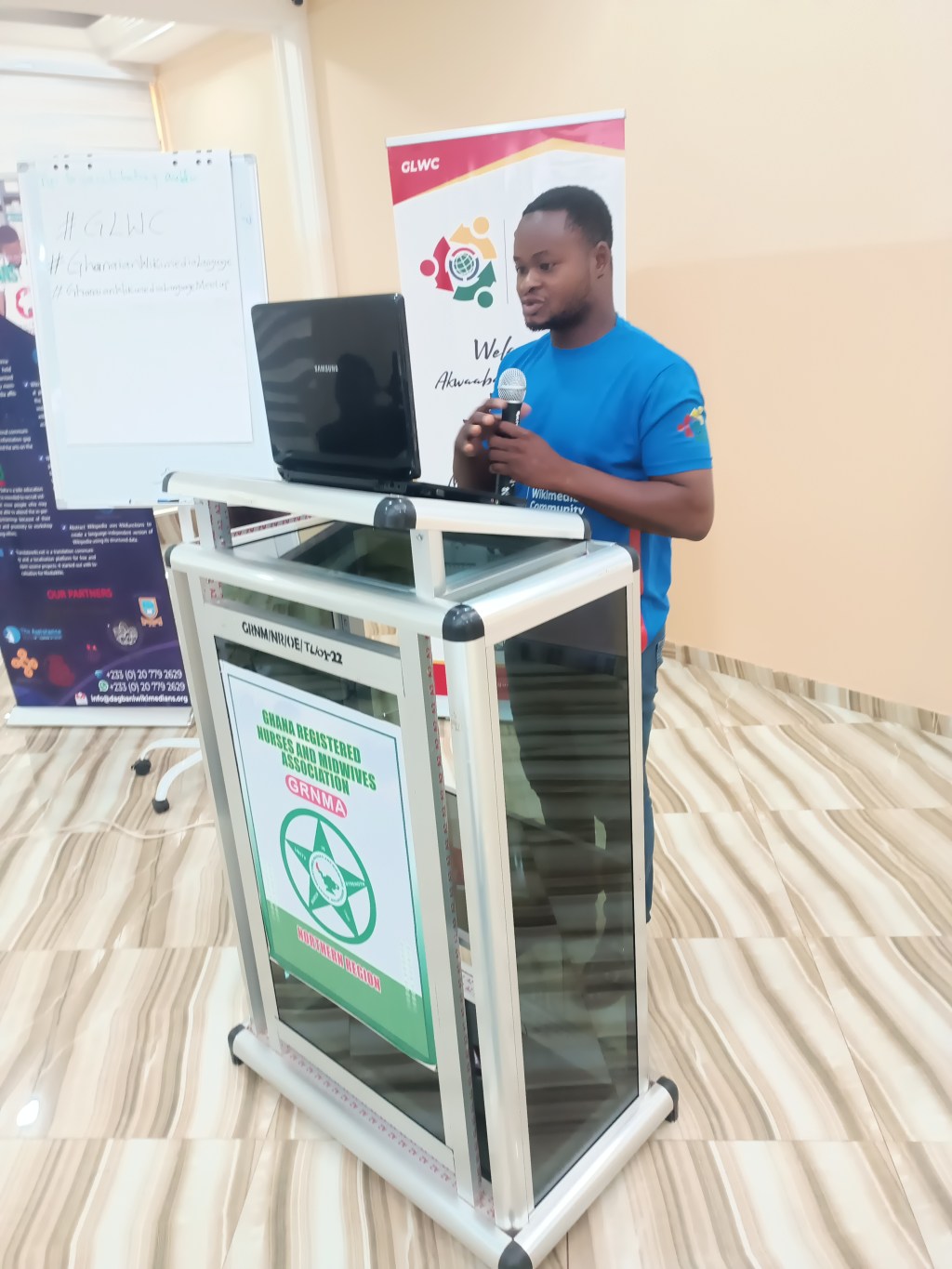
The Kusaal Wikimedians Community in perspective
Mr. Michael Awimbilla represented the Kusaal Wiki Community and provided an overview of their activities, achievements, challenges, and future plans. Here is a summary of his presentation:
Historical Background
The Kusaal Wikipedia platform was created by the Kusaal Wikimedia community in November 2022.
Achievements
Since the inception of Kusaal Wikipedia, the community has achieved several milestones:
- Active translation of Wikipedia terms started in January 2023, and by the end of the month, they met 100% of the translation requirements.
- After meeting the translation requirements, the community began creating and uploading articles on the Kusaal incubator main page. So far, they have created 200 articles covering topics such as culture, religion, and agriculture.
- The community is actively participating in a contest focused on the profile of the 275 parliamentarians of the 8th Parliament of the 4th Republic of Ghana. They have created over 70 parliamentarian profiles.
- A face-to-face training session was organized in three districts, resulting in the recruitment of more members and increased activities on the Wikipedia platform.
Resources Available
The Kusaal Wiki Community has access to a variety of resources, including over 50 titles of Kusaal literature, including the Kusaal Bible, which consists of 66 books, as well as a 1078-page dictionary. These resources will be distributed among members to facilitate the creation and uploading of articles, thereby accelerating their progress towards becoming a mainstream Wikipedia project.
Challenges
The community faces several challenges:
- Membership is not as large as expected, despite the presence of numerous Kusaal graduates.
- A significant number of members are inactive on the platform and not actively participating.
- Limited technical knowledge and lack of necessary equipment such as computers and smartphones, compounded by inadequate internet data, pose challenges for active participation.
- The protracted conflict situation in Bawku and its environs has had an impact on the community’s activities.
Plans/Way Forward
The Kusaal Wiki Community has outlined their plans for the future:
- They aim to work diligently to meet the requirements for transitioning to a mainstream Wikipedia project by the end of the year, with the support of their lead person in the name of Musah Fuseini (Musahfm)
- The community plans to mobilize resources and appeal to their Executive Director for support in facilitating the lead person’s travel to Ajumako to organize training sessions for both students and lecturers.
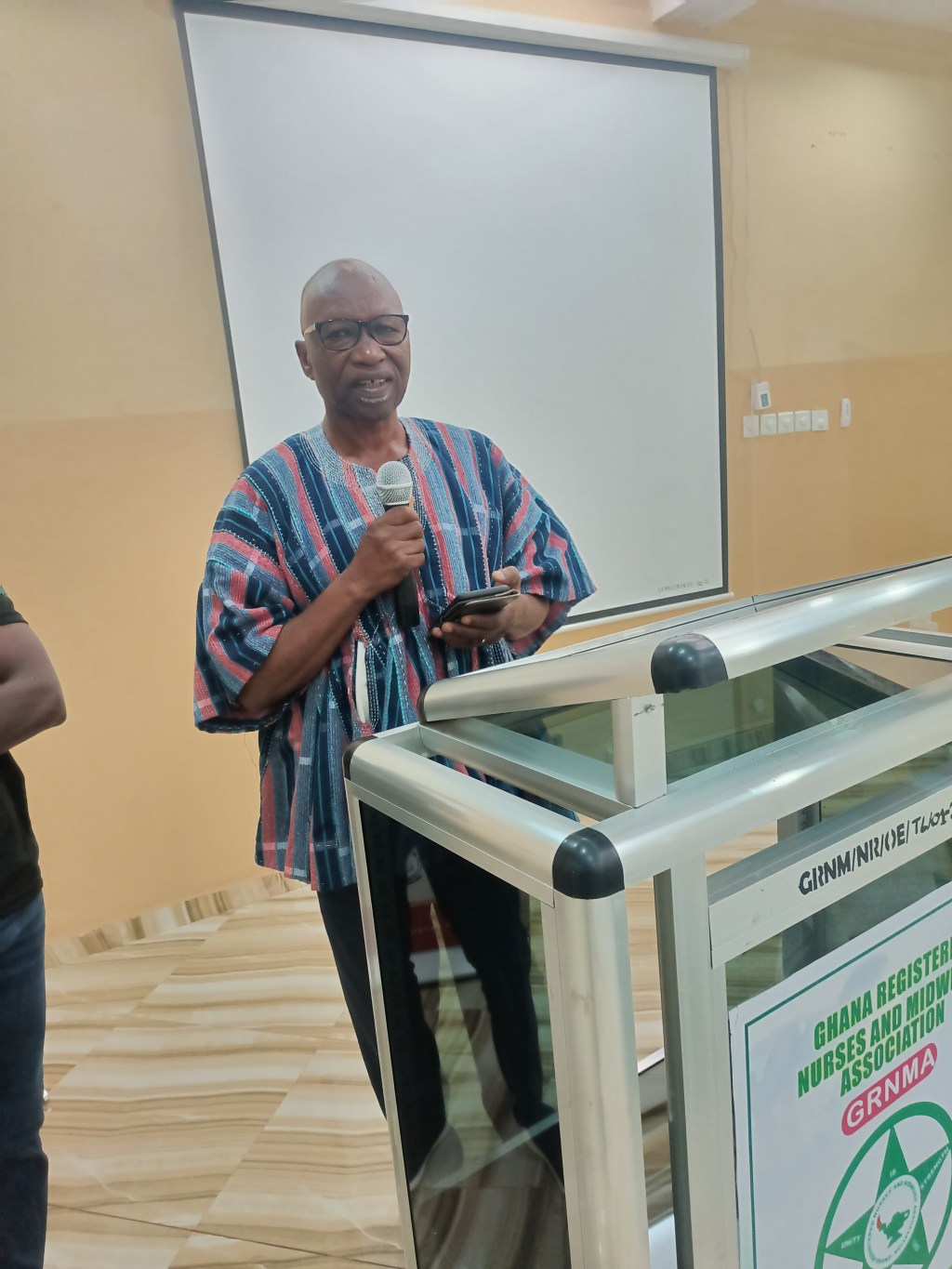
The Gurene Wikimedians Community in perspective
The Gurene Wiki community, represented by Madam Felicia Amoramah, delivered her presentation, and here are the key points covered in her presentation:
Translation of MediaWiki Statements:
- The Gurene Wiki community actively participated in translating MediaWiki statements. This effort ensures that important content related to the Wikimedia platform is available in the Gurene language, allowing users to engage with Wikipedia in their native language.
- Graduation from the Incubator:
This year, the Gurene Wiki successfully graduated from the incubator. After a period of development and growth, Gurene Wikipedia is now recognized as an independent and self-sustaining project within the Wikimedia ecosystem. This achievement is a testament to the dedication and hard work of the Gurene Wiki community.
- Participation in Wiki Loves Campaigns:
The Gurene Wiki community has actively participated in various Wiki Loves campaigns. These campaigns, such as Wiki Loves Monuments and Wiki Loves Earth, aim to document and showcase cultural heritage sites and natural landscapes through photography. By contributing to these campaigns, the Gurene Wiki community helps preserve and promote their cultural and natural heritage.
- Involvement in Parliament of Ghana Contest:
Currently, the Gurene Wiki community is taking part in the Parliament of Ghana contest. This contest involves creating and translating articles about the parliamentarians of the 8th Parliament of the 4th Republic of Ghana. By participating in this contest, the Gurene Wiki community contributes to making information about Ghana’s parliamentarians more accessible and available in the Gurene language.
The Ghanaian Pidgin Wikimedians Community in perspective
DaSupremo, representing the Ghanaian Pidgin community, gave a presentation, and here are the key points highlighted in his presentation:
Inception and Approval of Ghanaian Pidgin Wikipedia
The Ghanaian Pidgin Wikipedia project began in October 2021 with the goal of creating a platform to document and share knowledge in Ghanaian Pidgin. The hard work and dedication of the community led to the approval of the Ghanaian Pidgin Wikipedia as an independent and recognized project by 2023. This achievement demonstrates the significance and growing importance of Ghanaian Pidgin as a language for communication and cultural expression.
Independence and Autonomy
As an independent Wikipedia, the Ghanaian Pidgin community now has the freedom and autonomy to shape and develop their Wikipedia according to their specific linguistic and cultural needs. This independence allows them to create content that reflects the unique characteristics and expressions of Ghanaian Pidgin, fostering a sense of ownership and pride within the community.
Collaboration with Other Communities
The Ghanaian Pidgin community expressed their eagerness to collaborate with other communities. Collaboration opens up opportunities for sharing knowledge, resources, and experiences. By engaging with other language communities, the Ghanaian Pidgin community can foster connections, learn from one another, and contribute to the broader Wikimedia movement.
The Moore Wikimedians Community in perspective
Majeed Chef Hamidu presented an update on the Moore Wiki project. Here are the key points covered in the presentation:
The Moore Wikimedia community is a thriving community dedicated to promoting knowledge, preserving the cultural heritage of the Mossi people, and fostering linguistic diversity through the collaborative efforts of passionate individuals. Moore’s wikimedia community was incubated early in 2022 as part of the Mabia languages to be incubated by the Dagbani Wikimedia User Group. The group is made up of the Mossi people in Ghana and neighboring countries, especially Burkina Faso, who were brought in through a lot of advocacy on many social media platforms and personal meetings with the Mossi people.
The team organizes meet-ups in order to exchange ideas and find ways to support new editors and maintain existing editors so they can continue editing projects in areas where they would need help. This year, they have had four successive team meetings to discuss on projects and the way forward of the community
Team Members
Alhassan Alidu = Co-lead
Abdul Rafiu = Co-lead
Majeed Chef Hamidu = Facilitator
Abdul Rahman Hamidu = Communication, Social Media and Graphic Design Officer
Issaka Abdul Fatawu = Logistics Officer
Membership
On Whatsapp: they currently have 83 members who cut across Ghana and Burkina Faso
On Facebook: they have over 220 followers and likes.
On Telegram, there are 21 members. The lower number in telegram is attributed to the fact that most people are now familiar with telegram as compared to other social media platforms like whatsapp and facebook.
On linkedin: 70
On Instagram: 200
On twitter: they have about 200 followers
On Wikipedia Meta page, 27 people have signed to our page
Projects
In April 2022 they translated the most used statement on mediawiki on TranslateWiki.net
In June, they embarked on the Regions in Ghana writing contest, where all 16 regions in Ghana were translated from English to Moore from different sources on the internet.
In May 2022, they carried out Wiki Loves Earth 2022 in Ghana.
In August 2022, WikiVibrance launched the WikiVibrance International Youth Day (IYD) 2022 project.
On February 2023, they carried out the Wiki Loves Folklore 2023 in Ghana project.
In March, they co-carried the Feminism and Folklore in Ghana project with the Gurene Wikimedia Community.
Aside these projects, they participated in other projects like the World Heritage in Danger project and and currently, they are translating articles of member of parliament of the 4th republic
Recommendation
The uniqueness of the Moore people has been attributed to the orthography of the language due to its background among French-speaking people. Nevertheless, with their editors’ deficiencies, they have been able to create a lot of articles since its inception and are still counting on it.
The community has also created hubs in three public tertiary institutions in the Education Ridge Area of Tamale. These hubs are as follows;
- Bagabaga College of Education Hub
- Tamale College of Education Hub
- Tamale Technical University Hub
Plans are far advanced to set up another at the University for Development Studies, Tamale Campus, by the end of July this year.
Challenges
- Low turn up of editors
- Orthographical barrier
- Geographical barrier
- Language barrier
- Cost of internet
What to achieve this year
In Ghana, the community has planned to broaden the scope in Kumasi and Accra and, subsequently, all the regions in Ghana.
Before they highlight the next point, you need to appreciate that the Mossi are a Gur ethnic group native to modern Burkina Faso, primarily the Volta River basin. The Mossi are the largest ethnic group in Burkina Faso, constituting 52% of the population, or about 11.1 million people. The other 48% of Burkina Faso’s population is composed of more than 60 ethnic groups, mainly the Gurunsi, Senufo, Lobi, Bobo and Fulani. The Mossi speak the Mòoré language. Due to the population density and the root of the Moore language, the community’s main aim is to visit Burkina Faso to recruit interested and prolific writers who will be able to add volumes of contributions to the Wikipedia space and to bring to light the cultural practices of Burkina Faso and Ghana for the benefit of readers and researchers researching the culture of the indigenous Moore people.
Beyond the dream to launch Moore Wikimedia Community in Burkina Faso, they envisage going live and becoming a fully-fledged Wikipedia language community by the end of 2023.
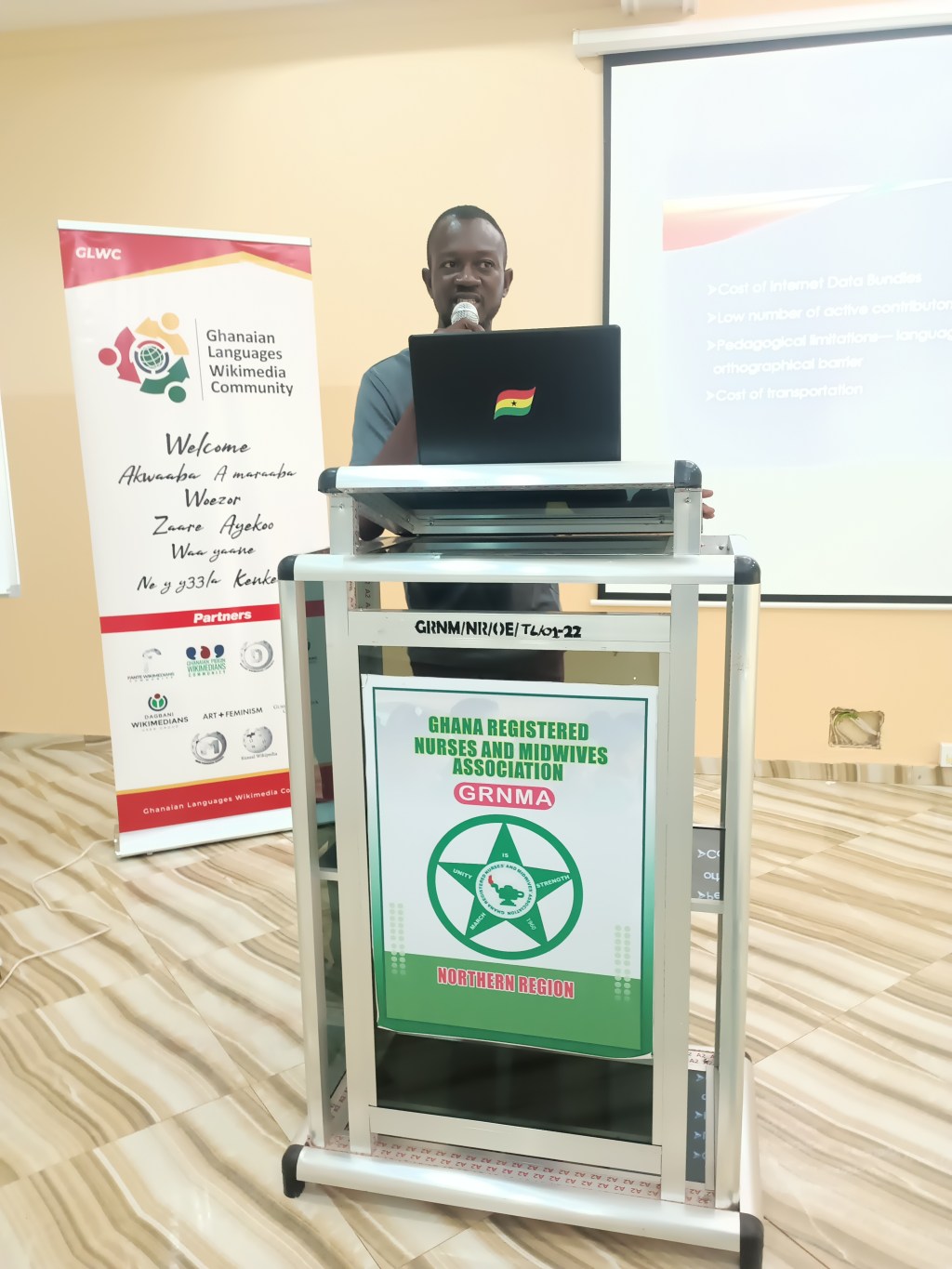
The Twi Wikimedians Community in perspective
Madam Jemima Antwi, the lead for Wikimedians of Twi Language, represented the Twi Wiki community and shared an overview of their notable projects and collaborations, Again, she highlighted important issues relevant to the community.
- Twi names of Day borns
The Twi community embarked on this project to document the meaning and history behind the Twi names given to dayborns, and this was a success.
Again, they embarked on another project dubbed “Twi Names,” where they created articles on Twi names and the history behind each name.
The Twi community continued to embark on a series of translations where they translated biographies of parliamentarians from Parliament 1 to 4. Madam mentioned that Parliament 5 and 6 are in the pipeline for Twi Translatathon 1, 2, 3, and 4.
- Growth and Development:
Madam Jemima Antwi discussed the growth and development of the Twi Wiki community. This included the number of active contributors, the expansion of content, and the engagement of users within the Twi-speaking community.
- Content Creation:
She emphasized the importance of creating quality content in the Twi language. This involves the translation and creation of articles, topics, and resources that cater to the needs and interests of Twi speakers. Encouraging contributors to write and share knowledge in Twi is crucial for the growth of the Twi Wiki.
- Community Engagement:
Madam Jemima Antwi highlighted the significance of community engagement within the Twi Wiki community. This involves encouraging new contributors to join, organizing events and workshops, and fostering a sense of collaboration and support among community members.
- Challenges and Opportunities:
She discussed the challenges faced by the Twi Wiki community, such as the need for more contributors, technical obstacles, or internet connectivity issues. Additionally, she highlighted the opportunities available for the community, such as partnerships with other language communities, participation in contests, or collaborations with educational institutions
- Future Plans:
Madam Jemima Antwi outlined the community’s future plans and goals. These included expanding the Twi Wikipedia’s reach, improving the quality and quantity of content, establishing partnerships, or engaging with the broader Wikimedia movement.
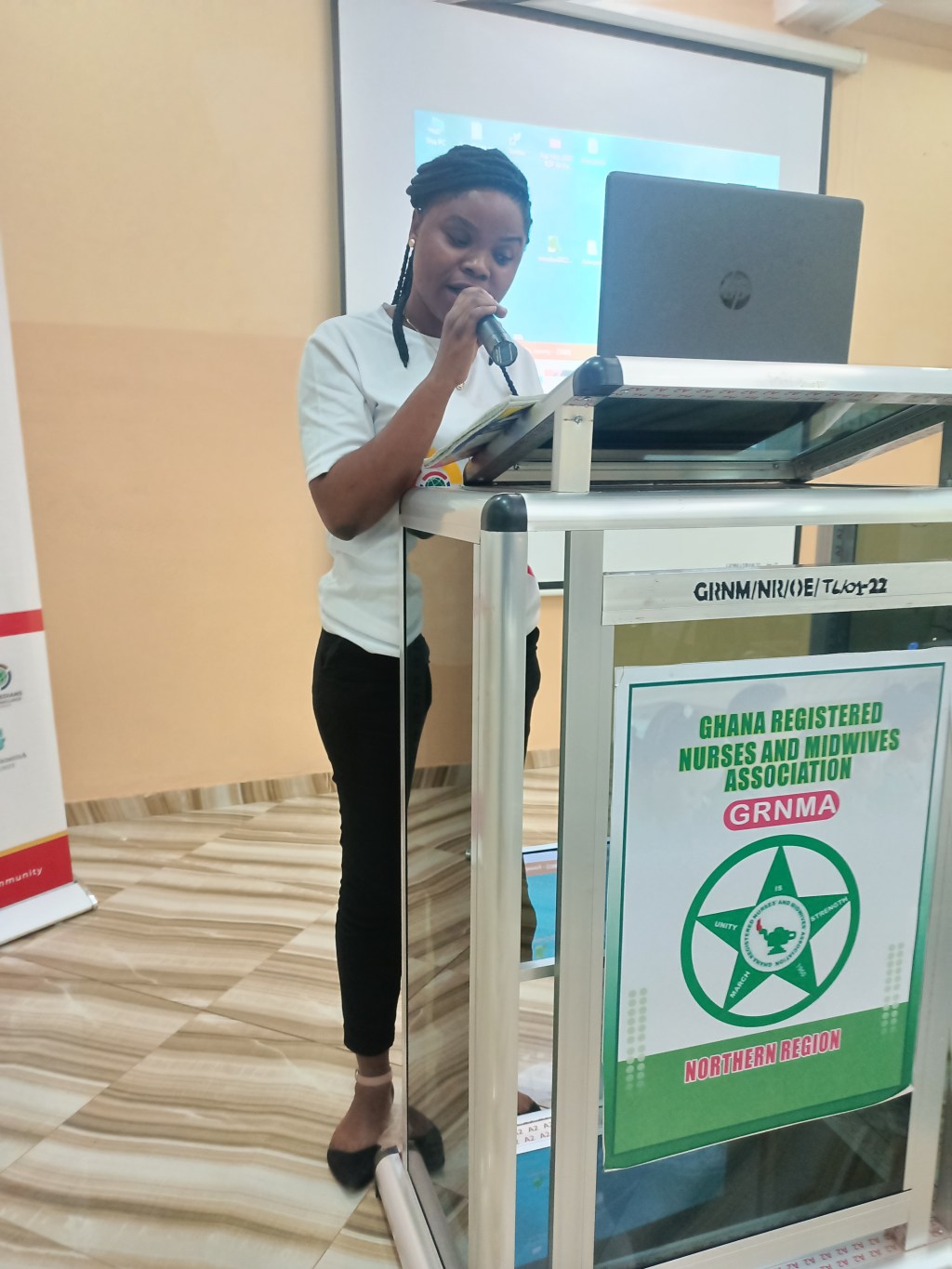
After presentations from different language communities, participants engaged in various indoor activities. These activities aimed to foster a sense of camaraderie and cultural exchange among the attendees. Some of the activities mentioned include:
- Kuraya Kuraya:
Kuraya Kuraya is a traditional Ghanaian game that involves hand clapping and rhythmic movements. Participants likely played this game, enjoying the traditional aspects of Ghanaian culture and promoting interaction among the attendees.
- Singing of Local Songs:
Participants engaged in singing local songs, showcasing the rich musical heritage of Ghana. This activity provided an opportunity for cultural expression and unity through music.
These activities created a joyful and inclusive atmosphere, allowing attendees to bond and further connect with each other. After the games and singing, Robert Jamal delivered the closing remarks, signaling the end of day one. He expressed gratitude to the participants, acknowledged the achievements of the day.
Overall, the combination of cultural games and music added a festive touch to the event, reinforcing the spirit of collaboration and celebration of Ghanaian linguistic and cultural diversity within the Wikimedia community.
Day Two
On day two of the Ghanaian Wikimedia Languages Meetup, the activities began with a recap of the events and highlights from day one. This recap served as a way to refresh the participants’ memories and ensure that everyone was on the same page regarding the progress made and discussions held during the previous day. It allowed participants to reflect on the achievements, challenges, and ideas shared, fostering a sense of continuity and building upon the momentum created on day one.
The recap included a summary of the presentations made by representatives from different language communities, highlighting the projects, achievements, challenges, and future plans discussed. This served as a reminder of the diverse efforts and contributions made by each community and helped to reinforce the collaborative and inclusive nature of the Wikimedia movement in Ghana.
Furthermore, the recap provided an opportunity for participants to share their thoughts and insights gained from the previous day’s activities. This allowed for further discussion and exploration of ideas, fostering a deeper understanding and engagement among the attendees.
A learning session was conducted, facilitated by Mr. Fuseini Mohammed Kamaldeen (Dnshitobu) from the Dagbani Wikimedia User Group. The focus of this session was to introduce participants to various tools on Wikidata that enhance the usefulness of content on Wikipedia.
Mr. Fuseini guided the participants through the features and functionalities of several tools, including:
- Hay Toolforge:
The Hay Toolforge is a tool that allows users to visualize the edit history of a particular Wikipedia article. It provides insights into the editing patterns, revisions, and contributions made to an article over time. This tool can help participants analyze and understand the evolution of content on Wikipedia.
- Catanalysis Toolforge:
The Catanalysis Toolforge is a tool designed to analyze categories on Wikipedia. It provides statistical information about the distribution, hierarchy, and usage of categories within the Wikipedia ecosystem. This tool assists participants in better understanding how categories are structured and utilized, enabling them to improve categorization efforts.
- Codelookup Toolforge:
The Codelookup Toolforge is a tool that helps participants decipher and understand various codes used on Wikidata. It provides a reference for code mappings and offers insights into the relationships and connections between different codes. This tool facilitates participants’ ability to navigate and utilize codes effectively within the Wikidata platform.
- wdprop Toolforge:
The wdprop Toolforge is a tool that allows participants to explore and query properties on Wikidata. It provides a way to retrieve specific information and attributes associated with items on Wikidata. This tool enables participants to extract relevant data and enhance the quality of content on Wikipedia.
During the learning session, participants had the opportunity to engage in hands-on exercises, applying the knowledge gained from Mr. Fuseini’s facilitation. This practical component allowed them to directly interact with the tools, explore their functionalities, and gain practical experience in utilizing them effectively.
By familiarizing participants with these tools and enabling them to engage in hands-on activities, the learning session aimed to equip attendees with the necessary skills and knowledge to leverage these tools to enhance the quality and usability of content on Wikipedia.
The Secretary of the Dagbani Teachers Association, Mr. Abukari Mohammed Awal, addressed the participants and delivered an inspiring message. He emphasized the importance of valuing and embracing one’s mother tongue, urging participants not to underestimate its significance. Mr. Awal encouraged the attendees to integrate their mother tongue into their lives, regardless of their environment or circumstances.
His message emphasized the following key points:
- Embracing Mother Language: Mr. Awal stressed the significance of acknowledging and appreciating one’s mother language. He encouraged participants to value their linguistic heritage and recognize the cultural richness embedded within their language.
- Cultural Identity: By embracing their mother language, Mr. Awal highlighted how participants could preserve and strengthen their cultural identity. Language is an integral part of cultural heritage, and nurturing one’s mother language helps maintain a connection to traditions, customs, and values.
- Language in Everyday Life: Mr. Awal urged participants to incorporate their mother language into their daily lives. Whether at home, school, or any other environment, he emphasized the importance of using and promoting their language to ensure its continued relevance and vitality.
A special award session was held to recognize the outstanding contributions made by participants in the Feminism and Folklore Articles Creation Contest. This contest specifically focused on the Moore and Gurene Wiki communities, highlighting their efforts to create articles related to feminism and folklore.
The award session aimed to celebrate the participants’ hard work, dedication, and creativity in contributing high-quality content to their respective language Wikipedias. It acknowledged their commitment to expanding knowledge and representation in these important thematic areas.
The award session not only provided recognition and encouragement to the winners but also inspired other participants to continue their efforts in creating valuable and diverse content in their respective languages. It highlighted the significance of feminism and folklore as important subjects that contribute to the cultural and historical knowledge of the Moore and Gurene communities.
Mr. Sadik Shahadu, the West Africa Language Coordinator for Art+Feminism, took the opportunity to discuss the importance and objectives of Art+Feminism. Art+Feminism is a global initiative that aims to address information gaps related to gender, feminism, and the arts, with a particular focus on improving content on platforms like Wikipedia.
Mr. Sadik Shahadu emphasized that Art+Feminism is dedicated to building a community of activists who are passionate about creating a more inclusive and equitable representation of gender and feminist perspectives within the arts. The initiative recognizes that historical and contemporary narratives often overlook or undervalue the contributions of women and non-binary individuals in the art world.
By focusing on Wikipedia, Art+Feminism recognizes the platform’s influence as a widely accessed and frequently referenced source of information. The goal is to expand and improve the coverage of women artists, feminist movements, and gender-related topics on Wikipedia to ensure a more accurate and balanced representation of the arts.
Art+Feminism encourages participants to organize edit-a-thons and other community events where volunteers come together to create and improve Wikipedia articles, particularly those related to underrepresented artists, artworks, and feminist perspectives. These events provide an opportunity for collective learning, skill-building, and knowledge-sharing among participants.
Through the collaborative efforts of volunteers worldwide, Art+Feminism aims to challenge the gender biases that exist within the art world and promote a more comprehensive understanding of the diverse contributions made by women and non-binary artists throughout history.
By introducing Art+Feminism at the Ghanaian Wikimedia Languages Meetup, Mr. Sadik Shahadu highlighted the importance of actively closing information gaps and promoting gender equity in the representation of art and feminism. He invited participants to join the movement, participate in edit-a-thons, and contribute to the collective effort of improving gender-related content on Wikipedia.
By empowering individuals to edit and create content, Art+Feminism aims to ensure that the arts reflect a broader and more inclusive narrative—one that recognizes and celebrates the achievements and perspectives of women and non-binary individuals in the artistic field.
In addition to discussing Art+Feminism, Mr. Sadik Shahadu also introduced the participants to the Wikimedia Language Diversity Hub. The Wikimedia Language Diversity Hub is an initiative that aims to support and promote linguistic diversity on Wikimedia platforms, including Wikipedia.
Mr. Sadik Shahadu highlighted the importance of preserving and promoting languages that are at risk of being marginalized or forgotten. The Language Diversity Hub serves as a central resource hub that provides tools, resources, and support for communities working on language-related projects within the Wikimedia movement.
The hub facilitates collaboration among language communities, encourages the creation and improvement of content in underrepresented languages, and promotes the development of language-specific Wikimedia projects. It provides a platform for sharing best practices, strategies, and success stories, enabling communities to learn from one another and collaborate on common goals.
By supporting language diversity, the Wikimedia Language Diversity Hub contributes to the broader mission of Wikimedia to provide free access to knowledge for everyone. It recognizes the cultural and linguistic richness that exists globally and seeks to ensure that knowledge is accessible and available in multiple languages.
Mr. Sadik Shahadu encouraged participants to explore the resources and opportunities offered by the Language Diversity Hub and to actively engage in language-related initiatives within their respective communities. He emphasized that by promoting linguistic diversity, participants can contribute to a more inclusive and representative knowledge ecosystem that values and respects the diversity of languages and cultures.
The introduction of the Wikimedia Language Diversity Hub provided participants with a broader perspective on the significance of linguistic diversity within the Wikimedia movement and underscored the importance of language-related projects in preserving cultural heritage and promoting knowledge sharing across different communities.
In his closing remarks, Mr. Faisal expressed his gratitude to the Wikimedia Foundation for their valuable support in making the Ghanaian Wikimedia Languages Meetup a success. He acknowledged the Foundation’s commitment to promoting knowledge equity and their continuous efforts to support language-related initiatives.
Mr. Faisal extended his appreciation to the core organizing team for their dedication and hard work in bringing together participants from diverse language communities. He acknowledged their efforts in planning and executing the event, ensuring that all languages were represented and given a platform to share their experiences and challenges.
Furthermore, Mr. Faisal expressed his heartfelt gratitude to all the language communities that participated in the meetup. He commended their enthusiasm, active engagement, and contributions throughout the event. Their presence and active participation were crucial in making the meetup a vibrant and enriching experience for everyone involved.
As the participants bid farewell to the event, Mr. Faisal noted the smiles on their faces, reflecting the positive and fruitful interactions that took place during the meetup. He expressed his hope that the connections made, knowledge shared, and collaborations formed during the event would continue to flourish and contribute to the growth and development of the Wikimedia movement in Ghana.
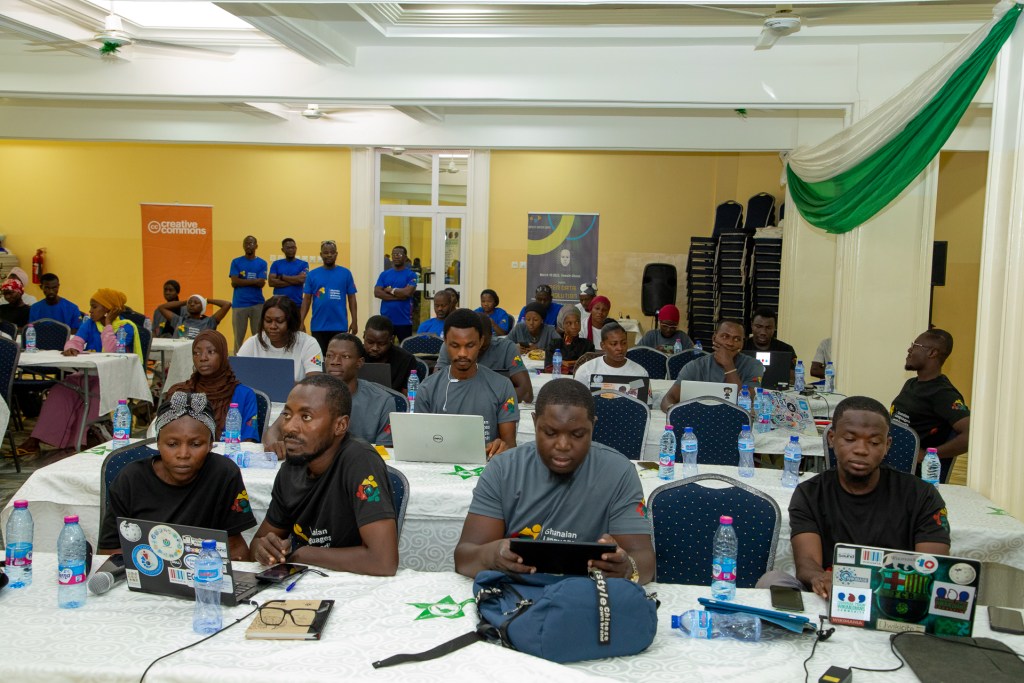

Can you help us translate this article?
In order for this article to reach as many people as possible we would like your help. Can you translate this article to get the message out?
Start translation